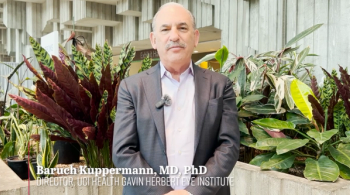
Martin David Harp

Editor, Ophthalmology Times
Articles by Martin David Harp

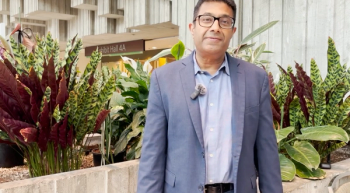
SriniVas R Sadda, MD, presented "Post Hoc Analysis of a Phase 3 Trial on SB15 (Proposed Aflibercept Biosimilar): Assessment on Pre-to-Post Switching Efficacy and Safety in Neovascular Age-related Macular Degeneration."
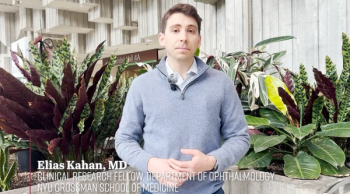
Elias Kahan, MD, speaks about wide-field contact specular microscopy and the expanding scope of corneal endothelial research.
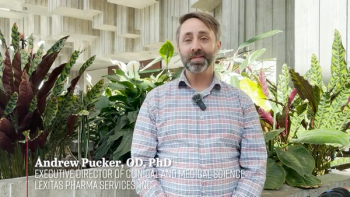
Pucker shares topline results from a study that investigated the difference in meibomobian gland morphology when measured with a Visante OCT versus an OCULUS Keratograph 5M
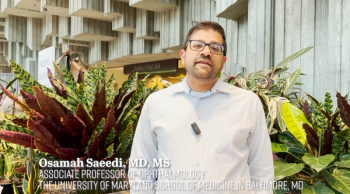
In a conversation with the Eye Care Network at ARVO, Osamah Saeedi, MD, MS, Associate Professor of Ophthalmology, Director of Clinical Research and Director of the Glaucoma Division at the University of Maryland School of Medicine, explained the key findings from his poster.
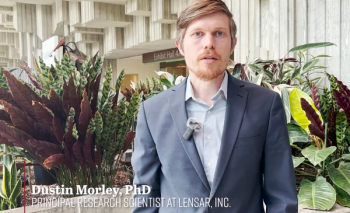
Dustin Morley, PhD, principal research scientist at LENSAR, discusses research on applying deep learning to benefit FLACS procedures.
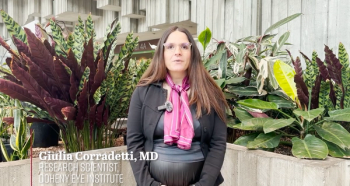
In a conversation with the Eye Care Network at ARVO, Corradetti, a research scientist at Doheny Eye Institute, explained the key findings from her work.
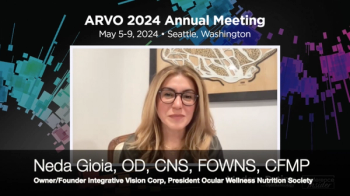
Neda Gioia, OD, sat down to discuss a poster from this year's ARVO meeting held in Seattle, Washington, from May 5 to May 9, on a multi-ingredient oral supplement on dry eye symptoms and tear volume.

John Sheppard, MD, MSc, FACs, sat down to discuss post-hoc analysis of 2 FDA registration trials for perfluorohexyloctane, GOBI and MOJAVE, at this year's ARVO meeting held in Seattle, Washington, from May 5 to May 9.

Eric Donnenfeld, MD, sat down to discuss presentations on the novel new artificial tear, Blink Triple Care, about its efficacy in a non-controlled trial as well as comparison to the Classic Blink at this year's ARVO meeting held in Seattle, Washington, from May 5 to May 9.


Cynthia Roberts, PhD, sat down to discuss a 5-year prospective study to compare ocular stiffness parameters in, diabetes with retinopathy, diabetes without retinopathy, and normal subjects at this year's ARVO meeting held in Seattle, Washington, from May 5 to May 9.
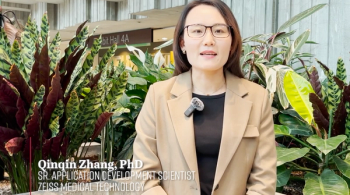
At this year's ARVO meeting, Qinqin Zhang, PhD, presented a poster titled "A unified deep learning model for geographic atrophy segmentation: Adaptable to SS-OCT and SD-OCT data with multiple scan patterns." At the conference she gave Ophthalmology Times an overview.

At this year's ARVO meeting, Paolo Silva, MD, presented data on Protocol AA on behalf of the DRCR Retina Network and the effect of diabetic retinopathy lesion location and severity on the risk for progression in the long term.
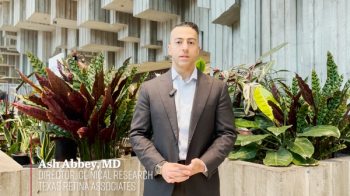
At this year's ARVO meeting, Ash Abbey, MD, Director of clinical research at Texas Retina Associates, presented 36-month data from the GALE study of pegcetacoplan for the treatment of dry age-related macular degeneration specifically geographic atrophy.

The A-IOL aims to correct both near and distance eyesight, reduce reliance on glasses or contact lenses, have no glare or halos, and restore the eye’s ability to focus.

Kamuvudine-8, also known as K8, is administered to the back of the eye via a sustained released intravitreal implant.

The trial is evaluating AURN001, a combination cell therapy product comprised of neltependocel (allogeneic human corneal endothelial cells [CECs]) and Y-27632 for the treatment of corneal edema secondary to corneal endothelial dysfunction.

Alcon was ordered to pay $34 million to Sight Sciences after a trial by jury.

The module encompasses real world data on more than 250,000 de-identified patients and provides information on extracting diagnoses from clinical notes in electronic health records.

The collaboration will bring automated, AI-powered OCT segmentation to MICRON Software Suite.

Annual conference to kick off May 5 in Emerald City.
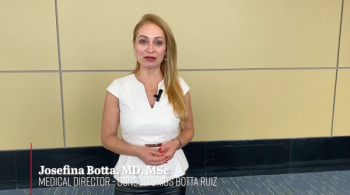
At this year's ASCRS meeting in Boston, Massachusetts, Josefina Botta, MD, MSc, discussed her real-world experiences with the RayOne EMV toric lens.
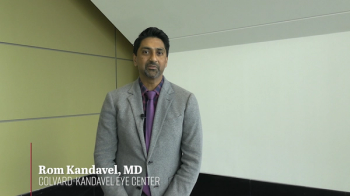
At this year's ASCRS meeting Rom Kandavel, MD, of Colvard-Kandavel Eye Center in Los Angeles, California discussed the paper he presented at the meeting, which focused on IOP lowering and medication burden for patients who received the iStent inject.

BVI lenses feature a unique C-loop haptic design, known as “POD,” introduced to the market with the launch of the PODEYE hydrophobic IOL in Europe in 2012.

A brief analysis showed that ChatGPT 3.5 performed better.

UPFs include fast food, energy drinks and soda, sweets such as chocolates and candies and much more.

At this year's ASCRS meeting, J. Morgan Micheletti, MD talked about myriad research projects he discussed at the meeting and also emphasized the importance of the Young Eye Surgeons (YES).
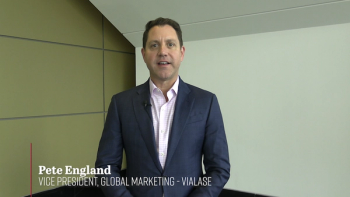
At this year's ASCRS meeting in Boston, Massachusetts, Pete England gave an update on ViaLase's development on the first femtosecond laser for the treatment of open-angle glaucoma.
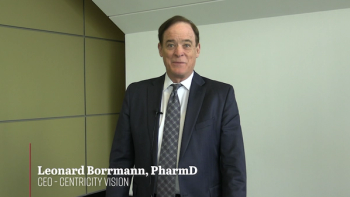
At this year's ASCRS meeting in Boston, Massachusetts, Leonard Borrmann, CEO at Centricity Vision, about the company's new product ZEPTOLink, including first-in-human data.

